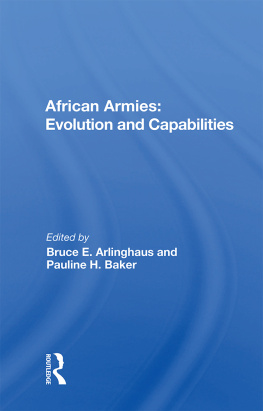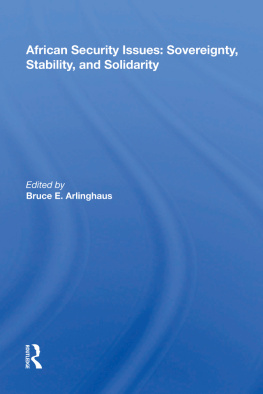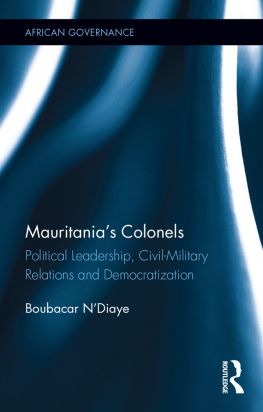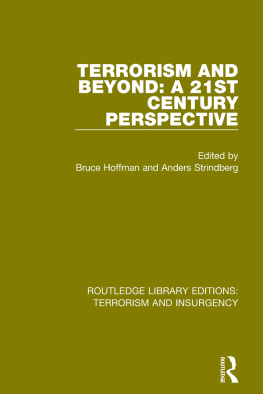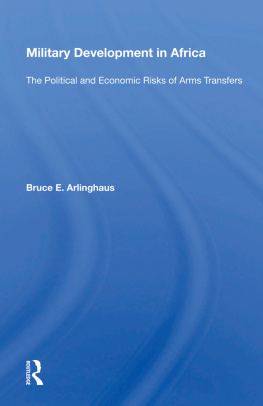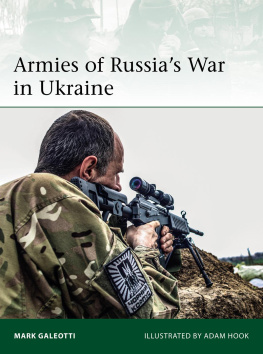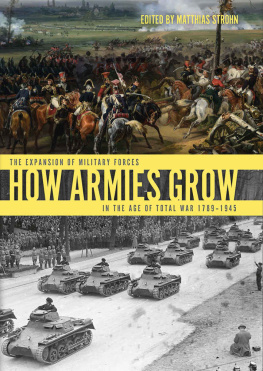African Armies
Also of Interest
Military Development in Africa: The Political and Economic Risks of Arms Transfers, Bruce E. Arlinghaus
African Security Issues: Sovereignty, Stability, and Solidarity, edited by Bruce E. Arlinghaus
Mercenary Troops in Modern Africa, Gerry Steven Thomas
In Search of Namibian Independence: The Limitations of the United Nations, Geisa Maria Rocha
The International Mandate System and Namibia, Isaak I. Dore
The OAU After Twenty Years, Amadu Sesay, Olusola Ojo, and Orobola Fasehun
The Political Economy of U.S. Policy Toward South Africa, Kevin Danaher
PROFILES OF CONTEMPORARY AFRICA:
Lesotho: Dilemmas of Dependence in Southern Africa, John Bardill and James H. Cobbe
Botswana; Liberal Democracy and the Labor Reserve in Southern Africa, Jack Parson
Ethiopia: Transition and Development in the Horn of Africa, Mullatu Wubneh and Yohannis Abate
Kenya: The Quest for Prosperity, Norman N. Miller
Mozambique: From Colonialism to Revolution, 1900-1982, Allen Isaacman and Barbara Isaacman
Senegal: An African Nation Between Islam and the West, Sheldon Gellar
Tanzania: An African Experiment, Rodger Yeager
Swaziland: Tradition and Change in a Southern African Kingdom, Alan Booth
Ghana: Coping with Uncertainty, Deborah Pellow and Naomi Chazan
Available in hardcover and paperback.
About the Book and Editors
African armies have undergone significant changes since African nations won independence from colonial rule. Once mainly small constabulary forces relegated to the maintenance of internal order, these armies have become larger, more modern institutions, largely in response to growing external security threats. Previous analyses have focused on African military units as political actors, with little or no attention paid to their actual abilities and desires to perform defense functions. This study examines the evolution of African armed forces, their impact on the societies in which they operate, and their current capabilities, with special attention to their effectiveness as military institutions.
Bruce E. Arlinghaus (major, U.S. Army) is currently a political-military affairs officer serving in the Plans Division of the Office of the Deputy Chief of Staff for Operations, Headquarters, U.S. Army, Europe. His publications include Military Development in Africa: The Political and Economic Risks of Arms Transfers (Westview, 1984) and African Security Issues: Sovereignty, Stability, and Solidarity (Westview, 1984). Pauline H. Baker is a senior associate at the Carnegie Endowment for International Peace in Washington, DC. Her publications include Urbanization and Political Change: The Politics of Lagos, 1917-1967 (1974), Obstacles to Private Sector Activities in Africa (1983), and The Economics of Nigerian Federalism (1984).
African Armies: Evolution and Capabilities
edited by Bruce E. Arlinghaus
and Pauline H. Baker
First published 1986 by Westview Press, Inc.
Published 2018 by Routledge
52 Vanderbilt Avenue, New York, NY 10017
2 Park Square, Milton Park, Abingdon, Oxon OX14 4RN
Routledge is an imprint of the Taylor & Francis Group, an informa business
Copyright 1986 Taylor & Francis
All rights reserved. No part of this book may be reprinted or reproduced or utilised in any form or by any electronic, mechanical, or other means, now known or hereafter invented, including photocopying and recording, or in any information storage or retrieval system, without permission in writing from the publishers.
Notice:
Product or corporate names may be trademarks or registered trademarks, and are used only for identification and explanation without intent to infringe.
Library of Congress Cataloging in Publication Data
Main entry under title:
African armies, evolution and capabilities.
Includes index.
1. AfricaArmed ForcesAddresses, essays, lectures.
I. Arlinghaus, Bruce E. II. Baker, Pauline H.
UA855.A35 1986 355'.0332'6 85-11550
ISBN 13: 978-0-367-02004-0 (hbk)
To Our Children
Benjamin Ekkehard Arlinghaus
Rebecca Andrea Arlinghaus
Deren James Baker
Gayle Janice Baker
Contents
, Bruce E. Arlinghaus
, Claude E. Welch, Jr.
, John M. Ostheimer
, Annette Seegers
, Walter L. Barrows
, William G. Thorn
, Charles P. Snyder
, Harry E. Colestock III
, Larry D. Harrison
, Pauline H. Baker
African armies have undergone significant changes since independence. What were mainly small constabulary forces, relegated to maintenance of internal order, have in many instances become larger, more modern organizations in response to growing African perceptions of external threats to their national security. This process has been largely uneven, subject to a number of internal and external forces that have influenced, if not determined, the shape of African military institutions. Previous analyses of the African military have focused almost exclusively on domestic politics, examining the role of soldiers as political actors. Little or no attention has been paid to the actual ability and desire of African armies to perform their defense functions and to fulfill the requirements of national security, however defined.
This book deals with the evolution of African armed forces within the context of their broader societies and assesses their current capabilities and effectiveness as military institutions. Emphasis is placed on specific political-military issues, as opposed to describing the order of battle of individual countries or subregions. The intent is to provide the reader with an idea of where African armies have come from, where they are today, and where they are headed tomorrow. This is no easy task because of the sensitive and subjective nature of the evaluation of military capabilities, and the authors offer their assessments as best estimates based upon available information. It is hoped that others will be stimulated to further research by the information and analysis offered here, so that the study of African armies will be advanced.
This volume is the fourth in a series of works based upon research on the subject of African military development. The first three books in the series were Arms for Africa, African Security Issues, and Military Development in Africa. African Armies was prepared while one of the editors, Bruce Arlinghaus, was an assistant professor in the Department of Social Sciences, U.S. Military Academy, West Point, and the other, Pauline H. Baker, was a research scientist in the National Security and Foreign Policy Study Center of the Battelle Memorial Institute. Separate but complementary research by both editors, which appeared previously in this series, led to continued collaboration on this book. We have found that the combination of a professional military officer, trained as an anthropologist and Africanist, and a professional political scientist, who has lived and worked for several years in Africa, represents an extremely fruitful and complementary mix of practical and theoretical backgrounds. Both of us are indebted to those colleagues who encouraged and supported our collaboration.

